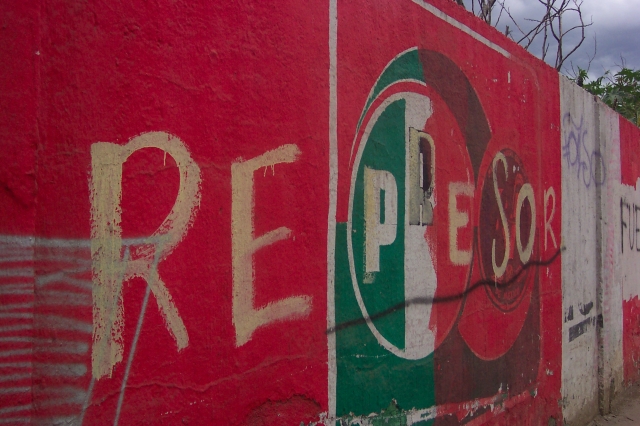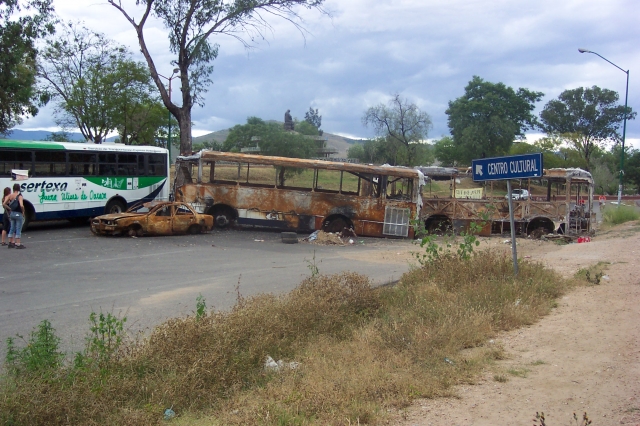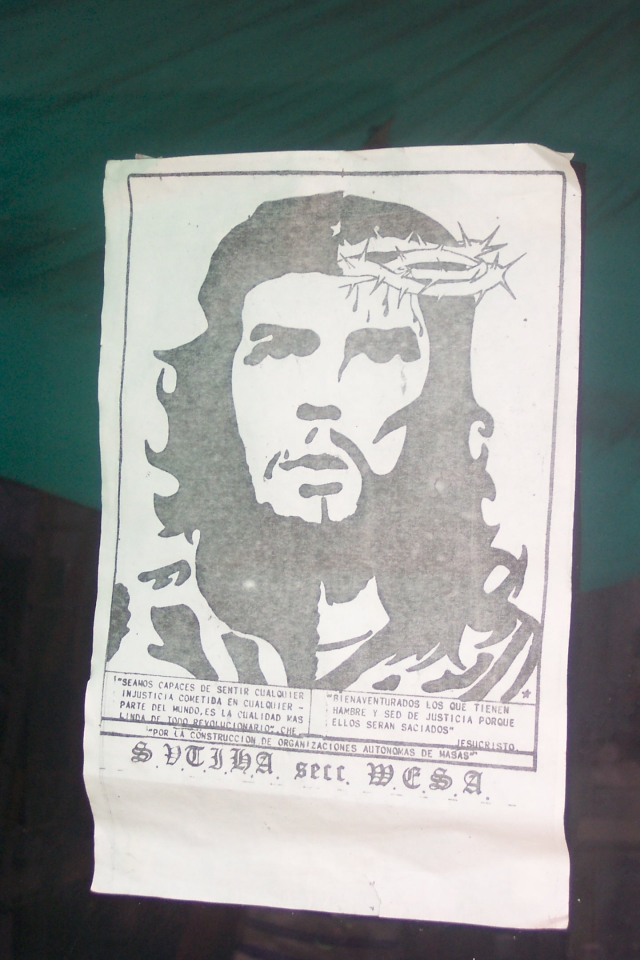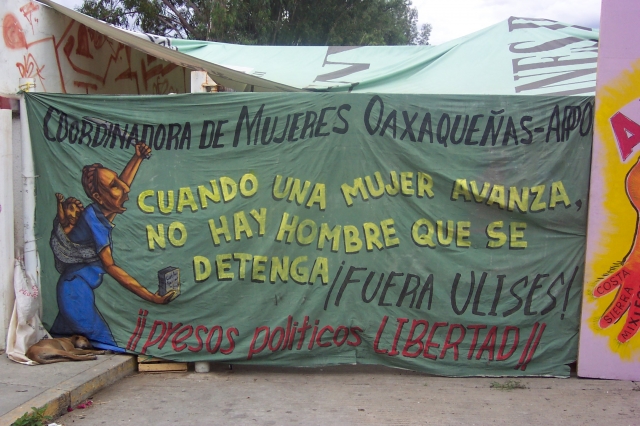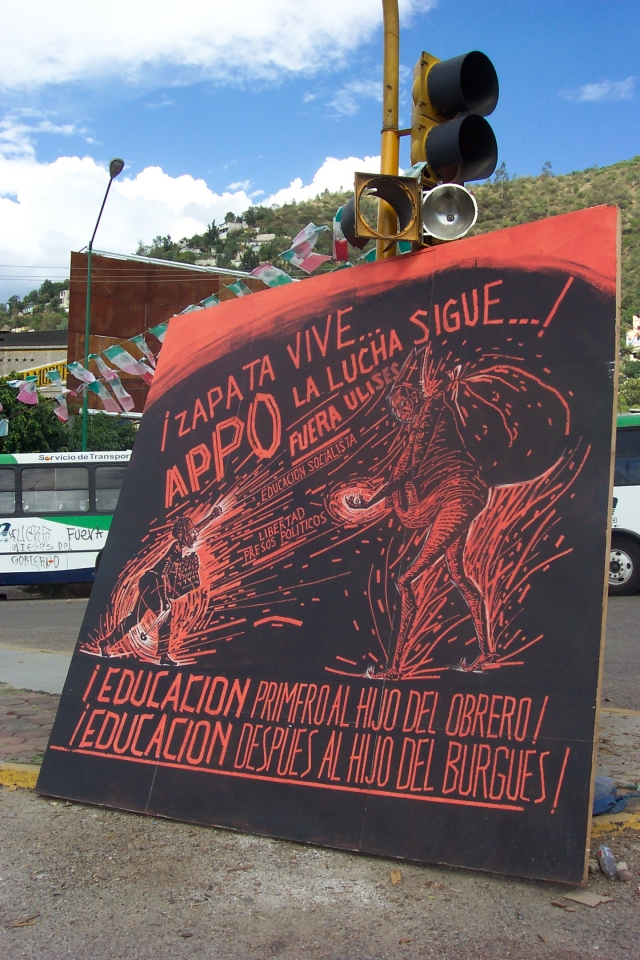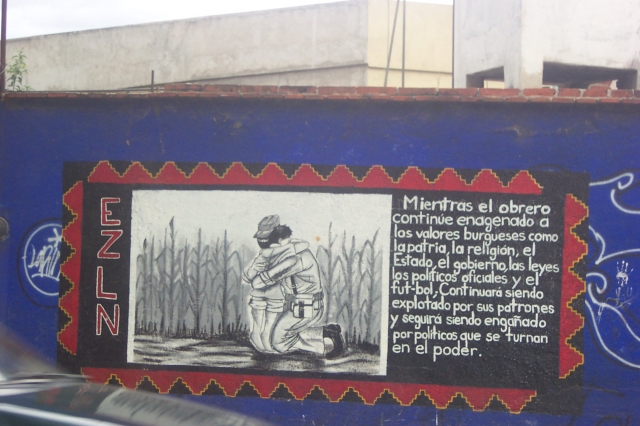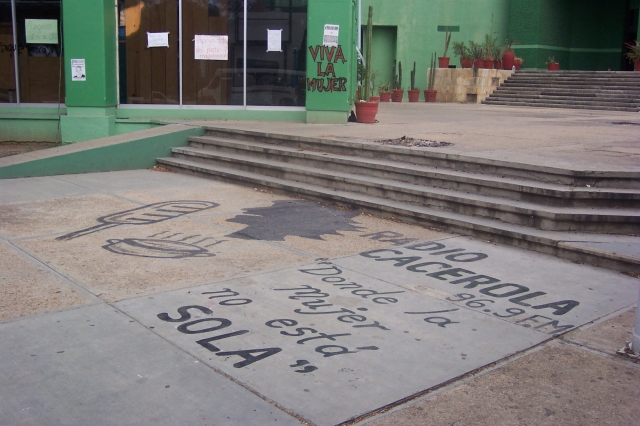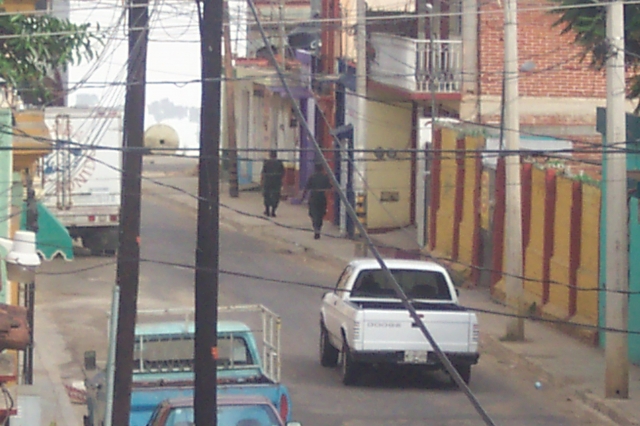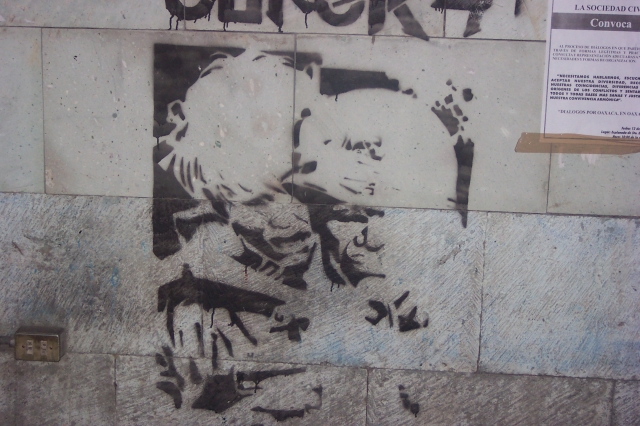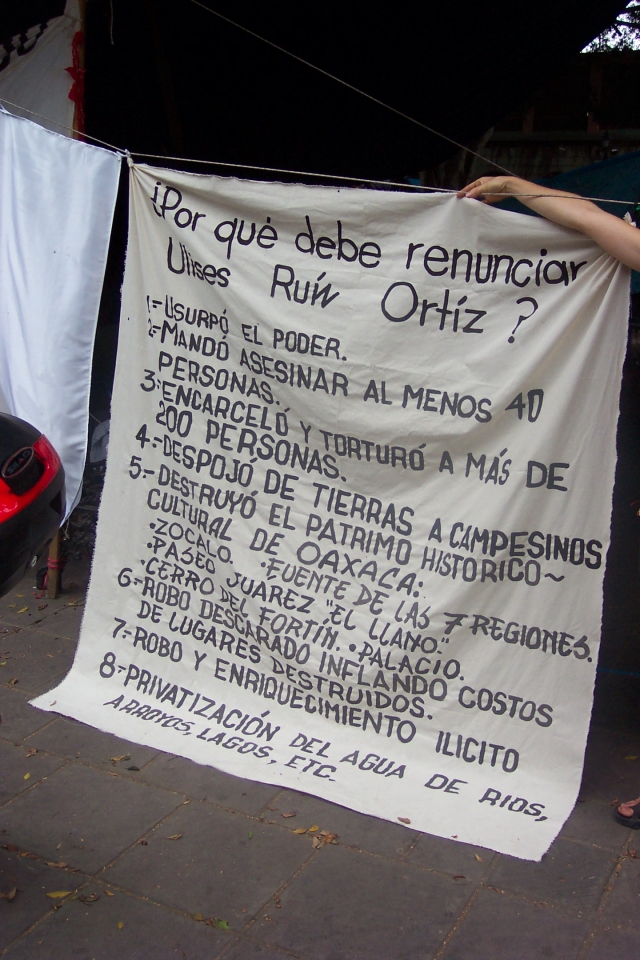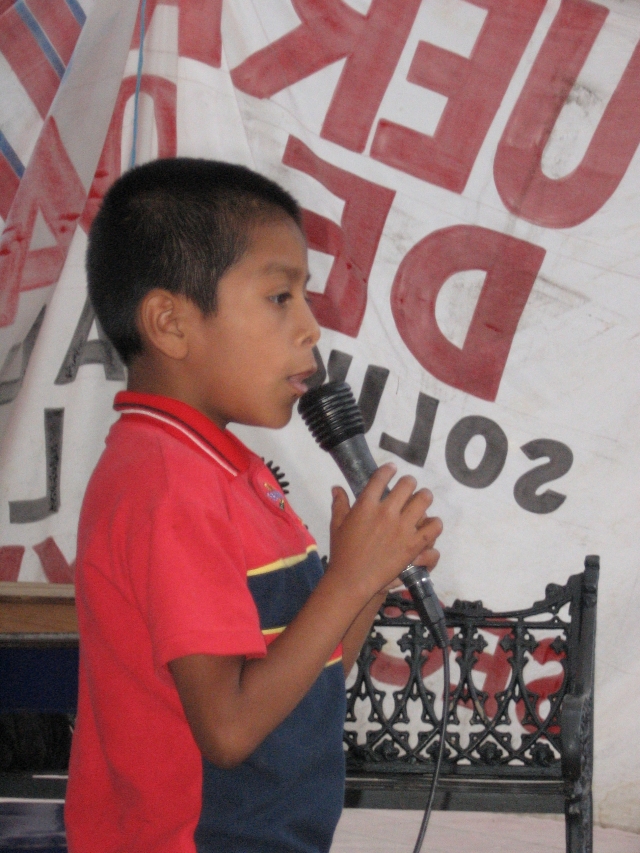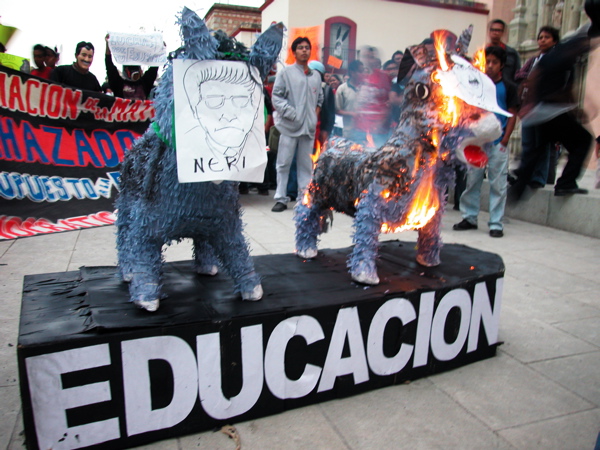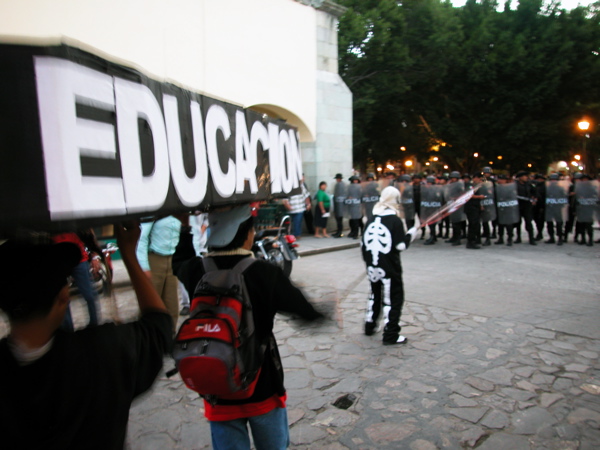From the Open-Publishing Calendar
From the Open-Publishing Newswire
Indybay Feature
Americas
International
Santa Cruz Indymedia
Education & Student Activism
Global Justice & Anti-Capitalism
From the Oaxaca Commune, we´re still waiting...
10.20.06 update from the Oaxaca Commune; with fotos from Canal 9, the central Zócalo, and the streets of Oaxaca City, with audio interview with a Oaxacan teacher in three parts, and a beautiful poem, read by a nine-year old boy, the child of a political prisoner here in Oaxaca.
Walking through the streets of Oaxaca City, a young man addresses a woman as they pass, "Buenos dias, Maestra." A simple greeting, but it speaks volumes. Respect and reverance. And not just for the teachers of Oaxaca. A couple days ago we visited Canal 9, the Gov't-run TV & radio station and cultural compound which was taken over by a contingent of women back in August. We walked through the barricades, midday, interrupting lunch at the kitchen pitched in the former driveway. The initial reaction (damn, some tourists are interrupting our lunch) faded quickly when we mentioned that we were teachers in our home state. Join us! Sit down! You have to eat with us! (We had just eaten lunch) Sit down anyway! Have a drink! Some beans? Rice? Tortillas? (chile, salad, dumplings...) At least they let us wash our own dishes. They showed us around and told us the story of la toma (the take), how during a march someone suggested offhand that they take control of the TV station, and how somehow it happened without much thought of what would happen next (They decided to produce television programs that focused on the lives of poor women--quite a change from the usual television programming featuring the lives of rich white people who happen to speak Spanish).
A short tangent, but this is the first place I've been on earth where people *aren't* glued to their TVs. I even travel with a small universal remote control that turns off any TV, but I haven't needed it yet. The only TVs I've seen have been showing the news (well, and some novelas). If there were a major strike in the States, everyone would be alone on their own couch in their own house, catching up on missed Tivo. After the women took over the State-run TV station, groups of teachers took over twelve radio stations. Twelve. In one night. Some have been given back, some were attacked and lost to government forces, others sabatoged by porros (gov't sympathizers). Others remain under the control of the people. The earlier interview [http://indybay.org/newsitems/2006/10/17/18320828.php] with a couple of teachers at La Ley barricade protects one such station, which formerly broadcast pop music. The University´s radio station [http://www.uabjo.mx/radio/radioOnLine.php] just resumed programming. It´s a truly incredible lineup, with amazing words and music. But there's a radio antennae every few blocks in Oaxaca City, and radio is a big part of Oaxacan culture, something people have fought for for a long time. A radio in each indigenous language, for example. A radio station that broadcasts the location of invading federales...
Everyone waits. For word from D.F., for some kind of resolution. I'm not sure what the strategy is. On one hand, dragging out the talks as a stall tactic might work--the people could get impatient with the constant marches, with the lack of classes, with the lack of paychecks, with the dip in tourism... it´s true that people are becoming increasingly desperate. But the more effective strategy would be, I think, to just cut Ulises loose, to give in on the central demand and maintain their hold on power. But the PRI won't give him up, won't concede even one step. The PAN party just yesterday began to adopt this strategy, with several members quoted in this morning´s paper saying that he´s been asked to resign, he´s been threatened with repercussions if he refuses,... His response was to give a speech asking for 50 Million dollars to restore government offices and historical buildings in Oaxaca City. He seems more than a little bit out of touch.
The demand for his ouster is so central that it's almost like the PRI and the Mexican government could sack him and move on, quell resistance and maintain the status quo in most aspects. But their refusal to let Ulises fall is a hubris that will cost them, because in the meantime Oaxacans are building an alternative to the uninterrupted rule of the PRI (while many celebrated the election of Fox as the end of PRI rule, they have not loosened their grip in several states). The initial plan, the strike authorized by the teachers so many months back, was only four days. It's been more than four months now.
And so they sit in the Zocalo, playing cards, sewing, playing with kids, reading the newspaper to each other, having meetings, organizing medical care, sharing food. Flirting. There are no less than three video monitors set up, informing tourists and passersby about the violent attack on the teachers back in June. Crowds watch the images of Police attacking teachers just feet from where the monitors are set up. Videos for sale--documentaries about earlier revolutionary movements in Oaxaca, armed and non-violent, clandestine and political. Crowds of German or French tourists stop and watch, and learn. Tourists from the States seem to have gotten the message: In Oaxaca there's disorder in the streets. Its people are no longer content to dance and cook for you. Some of the nicest hotels remain closed. An uprising. But others continue to come, see the sights.
There have been two APPO supporters killed this week: a painter and a teacher. Two autopsies filmed by human rights observers, two memorials in the Zocalo. There have been many more over the past few months, but as more time passes it seems like the violence comes in waves. They're starting to use the term "death squads" to describe the teams of out-of-uniform cops and military that are always found responsible for the shootings at the barricades or at the building occupations. There are some soldiers and cops around from time to time (See picture below). Last night after Panfilo Hernandez Vasquez was shot and killed, two police patrol cars were stopped and smashed in retribution. But no one was hurt--just some smashed windows and a couple of no-longer-driveable cars to add to the barricade. This movement has been unarmed for the whole time. Sticks, sometimes machetes, but never guns. But until what point? How many teachers, picked off by gunfire in the night, as the seemingly endless negotiations drag on? How many memorials in the Zocalo? How long before a guerrila movement resurfaces? Before people leave the morgue with retribution in mind?
And this is in the City--the cosmopolitan center with spas and fancy hotels and bookstores and shops with perfume and sunglasses. Out in the colonias, in the canyons, in the rural areas of Oaxaca, where the poverty is crushing and the margin of survival is slimmer than the new cell phones on sale in the market... the struggle is even tougher there, where there are fewer cameras, fewer eyes, fewer donations. There have been no paychecks for a couple months now, and more and more people are speaking publicly about the bribes, the offers. People are being offered cash to attack the barricades, to teach in schools as scabs, to protest in favor of Ulises and the PRI. Some firemen caught dismantling a barricade said they were ordered to do so by Ulises himself.
Right wingers in the states love to say that Mexicans don't value education, or that they should go back to Mexico and fix their own country. Many of the teachers I've talked to have been to the states--worked in LA or Oakland, the Central Valley. Most have family there. They've always heard of Santa Cruz, Monterey, Salinas. But the teachers who speak so eloquently of the struggle, who hold such a deep knowledge of the history of education, who lecture on the importance of understanding pedagogical methods of instruction, have all worked as dishwashers or landscapers in the states. They leave Universities and corporate offices, they leave museums and administrative positions to mop floors and scrub toilets because the pay in Oaxaca is so dismal, because it's one of the poorest places in the hemisphere, because the rich rule with impunity and impose a system that makes such migration necessary, encourages people to leave their land so that it can be sold to make way for superhighways and hydroelectric projects. At the end of one of the audio pieces below (maestra--edu en Oax), a teacher says that the government's primary interest is "drowning us in poverty."
Mexicans *are* struggling to "fix their own country." They have been for a long time. And for it they are shot dead in the streets of Oaxaca City. Raped in jails in Atenco. Assasinated in Tijuana. Hunted in Chiapas. Laughed at in Cancun. Mutilated and dumped in the desert of Chihuahua. Blacklisted in oil-rich Tabasco. Paved over to make way for resorts along the Pacific Coast. Marginalized everywhere else. And the fight in Oaxaca has always been about a free and legitimate education. Listen to any of the teachers speak, in this post and in others. See "Granito de Arena," a film made about the long and intense struggle for public education in Mexico, made even before this year's uprising [http://www.corrugate.org/granito_de_arena/granito_de_arena]. Share it with coworkers, family and friends. And counter those statements, made out of ignorance, with the truth of what's happening in our neighboring country.
The teachers here are intensely curious about the politics of the States. They wonder why the government would propose the construction of the "Wall of Shame," much less why the citizens would allow it to be built. They wonder how the hell we ended up with Arnold for our Governor, and are quite interested to hear that he replaced a Governor who was "recalled," something they are trying to accomplish in Oaxaca. Why haven't you risen up against Bush and stopped the war(s)? How did that recall thing work out, anyway??
People here are waiting, impatiently of course. So the building occupations continue. Random government offices are occupied permanently or temporarily, with cooperation or without. Today a defeat--the Senate announced they will not endorse the ´disappearance of powers,´ meaning that they believe Oaxaca is not out of their control, that the system is not broken, that they still rule Oaxaca. It´s not a surprise, but there was the potential that the Federal Government would concede the ´ingovernability´of the people of Oaxaca and procede with a plan for a new system of government. The people speak of a tremendous hope--for they do see victory all around them in the occupied streets, the Oaxaca Commune--but they fear its eventual destruction. They fear everything they've worked so hard for will be taken away. That the army will come in and smash everything. They fear a blood bath. And so they wait. For an answer, a response. For the army. For a victory, either granted from above or in the form of some concession, some admission of defeat.
10.20.06
Last week after a march entered town and arrived at the Zocolo, a nine year old boy named Cristobal Ramirez Cruz got up on stage and recited a poem called "Maestro." I caught up with him after and asked him to repeat it, asked him to tell me a little bit about himself. The other three files are the words of a teacher who saw Cristobal recite his poem. By their reaction I could tell they were teachers (they watched the little boy recite the poem, impressed and obviously proud of his potential as a student), and so we talked for a little while. First she gives an indictment of Ulises Ruiz Ortiz, then discusses Oaxaca as a model for the rest of Mexico, and finally discusses the state of education in Oaxaca. All four mp3s are below the photos.
A short tangent, but this is the first place I've been on earth where people *aren't* glued to their TVs. I even travel with a small universal remote control that turns off any TV, but I haven't needed it yet. The only TVs I've seen have been showing the news (well, and some novelas). If there were a major strike in the States, everyone would be alone on their own couch in their own house, catching up on missed Tivo. After the women took over the State-run TV station, groups of teachers took over twelve radio stations. Twelve. In one night. Some have been given back, some were attacked and lost to government forces, others sabatoged by porros (gov't sympathizers). Others remain under the control of the people. The earlier interview [http://indybay.org/newsitems/2006/10/17/18320828.php] with a couple of teachers at La Ley barricade protects one such station, which formerly broadcast pop music. The University´s radio station [http://www.uabjo.mx/radio/radioOnLine.php] just resumed programming. It´s a truly incredible lineup, with amazing words and music. But there's a radio antennae every few blocks in Oaxaca City, and radio is a big part of Oaxacan culture, something people have fought for for a long time. A radio in each indigenous language, for example. A radio station that broadcasts the location of invading federales...
Everyone waits. For word from D.F., for some kind of resolution. I'm not sure what the strategy is. On one hand, dragging out the talks as a stall tactic might work--the people could get impatient with the constant marches, with the lack of classes, with the lack of paychecks, with the dip in tourism... it´s true that people are becoming increasingly desperate. But the more effective strategy would be, I think, to just cut Ulises loose, to give in on the central demand and maintain their hold on power. But the PRI won't give him up, won't concede even one step. The PAN party just yesterday began to adopt this strategy, with several members quoted in this morning´s paper saying that he´s been asked to resign, he´s been threatened with repercussions if he refuses,... His response was to give a speech asking for 50 Million dollars to restore government offices and historical buildings in Oaxaca City. He seems more than a little bit out of touch.
The demand for his ouster is so central that it's almost like the PRI and the Mexican government could sack him and move on, quell resistance and maintain the status quo in most aspects. But their refusal to let Ulises fall is a hubris that will cost them, because in the meantime Oaxacans are building an alternative to the uninterrupted rule of the PRI (while many celebrated the election of Fox as the end of PRI rule, they have not loosened their grip in several states). The initial plan, the strike authorized by the teachers so many months back, was only four days. It's been more than four months now.
And so they sit in the Zocalo, playing cards, sewing, playing with kids, reading the newspaper to each other, having meetings, organizing medical care, sharing food. Flirting. There are no less than three video monitors set up, informing tourists and passersby about the violent attack on the teachers back in June. Crowds watch the images of Police attacking teachers just feet from where the monitors are set up. Videos for sale--documentaries about earlier revolutionary movements in Oaxaca, armed and non-violent, clandestine and political. Crowds of German or French tourists stop and watch, and learn. Tourists from the States seem to have gotten the message: In Oaxaca there's disorder in the streets. Its people are no longer content to dance and cook for you. Some of the nicest hotels remain closed. An uprising. But others continue to come, see the sights.
There have been two APPO supporters killed this week: a painter and a teacher. Two autopsies filmed by human rights observers, two memorials in the Zocalo. There have been many more over the past few months, but as more time passes it seems like the violence comes in waves. They're starting to use the term "death squads" to describe the teams of out-of-uniform cops and military that are always found responsible for the shootings at the barricades or at the building occupations. There are some soldiers and cops around from time to time (See picture below). Last night after Panfilo Hernandez Vasquez was shot and killed, two police patrol cars were stopped and smashed in retribution. But no one was hurt--just some smashed windows and a couple of no-longer-driveable cars to add to the barricade. This movement has been unarmed for the whole time. Sticks, sometimes machetes, but never guns. But until what point? How many teachers, picked off by gunfire in the night, as the seemingly endless negotiations drag on? How many memorials in the Zocalo? How long before a guerrila movement resurfaces? Before people leave the morgue with retribution in mind?
And this is in the City--the cosmopolitan center with spas and fancy hotels and bookstores and shops with perfume and sunglasses. Out in the colonias, in the canyons, in the rural areas of Oaxaca, where the poverty is crushing and the margin of survival is slimmer than the new cell phones on sale in the market... the struggle is even tougher there, where there are fewer cameras, fewer eyes, fewer donations. There have been no paychecks for a couple months now, and more and more people are speaking publicly about the bribes, the offers. People are being offered cash to attack the barricades, to teach in schools as scabs, to protest in favor of Ulises and the PRI. Some firemen caught dismantling a barricade said they were ordered to do so by Ulises himself.
Right wingers in the states love to say that Mexicans don't value education, or that they should go back to Mexico and fix their own country. Many of the teachers I've talked to have been to the states--worked in LA or Oakland, the Central Valley. Most have family there. They've always heard of Santa Cruz, Monterey, Salinas. But the teachers who speak so eloquently of the struggle, who hold such a deep knowledge of the history of education, who lecture on the importance of understanding pedagogical methods of instruction, have all worked as dishwashers or landscapers in the states. They leave Universities and corporate offices, they leave museums and administrative positions to mop floors and scrub toilets because the pay in Oaxaca is so dismal, because it's one of the poorest places in the hemisphere, because the rich rule with impunity and impose a system that makes such migration necessary, encourages people to leave their land so that it can be sold to make way for superhighways and hydroelectric projects. At the end of one of the audio pieces below (maestra--edu en Oax), a teacher says that the government's primary interest is "drowning us in poverty."
Mexicans *are* struggling to "fix their own country." They have been for a long time. And for it they are shot dead in the streets of Oaxaca City. Raped in jails in Atenco. Assasinated in Tijuana. Hunted in Chiapas. Laughed at in Cancun. Mutilated and dumped in the desert of Chihuahua. Blacklisted in oil-rich Tabasco. Paved over to make way for resorts along the Pacific Coast. Marginalized everywhere else. And the fight in Oaxaca has always been about a free and legitimate education. Listen to any of the teachers speak, in this post and in others. See "Granito de Arena," a film made about the long and intense struggle for public education in Mexico, made even before this year's uprising [http://www.corrugate.org/granito_de_arena/granito_de_arena]. Share it with coworkers, family and friends. And counter those statements, made out of ignorance, with the truth of what's happening in our neighboring country.
The teachers here are intensely curious about the politics of the States. They wonder why the government would propose the construction of the "Wall of Shame," much less why the citizens would allow it to be built. They wonder how the hell we ended up with Arnold for our Governor, and are quite interested to hear that he replaced a Governor who was "recalled," something they are trying to accomplish in Oaxaca. Why haven't you risen up against Bush and stopped the war(s)? How did that recall thing work out, anyway??
People here are waiting, impatiently of course. So the building occupations continue. Random government offices are occupied permanently or temporarily, with cooperation or without. Today a defeat--the Senate announced they will not endorse the ´disappearance of powers,´ meaning that they believe Oaxaca is not out of their control, that the system is not broken, that they still rule Oaxaca. It´s not a surprise, but there was the potential that the Federal Government would concede the ´ingovernability´of the people of Oaxaca and procede with a plan for a new system of government. The people speak of a tremendous hope--for they do see victory all around them in the occupied streets, the Oaxaca Commune--but they fear its eventual destruction. They fear everything they've worked so hard for will be taken away. That the army will come in and smash everything. They fear a blood bath. And so they wait. For an answer, a response. For the army. For a victory, either granted from above or in the form of some concession, some admission of defeat.
10.20.06
Last week after a march entered town and arrived at the Zocolo, a nine year old boy named Cristobal Ramirez Cruz got up on stage and recited a poem called "Maestro." I caught up with him after and asked him to repeat it, asked him to tell me a little bit about himself. The other three files are the words of a teacher who saw Cristobal recite his poem. By their reaction I could tell they were teachers (they watched the little boy recite the poem, impressed and obviously proud of his potential as a student), and so we talked for a little while. First she gives an indictment of Ulises Ruiz Ortiz, then discusses Oaxaca as a model for the rest of Mexico, and finally discusses the state of education in Oaxaca. All four mp3s are below the photos.
Listen now:
Listen now:
Listen now:
Listen now:
Add Your Comments
Comments
(Hide Comments)
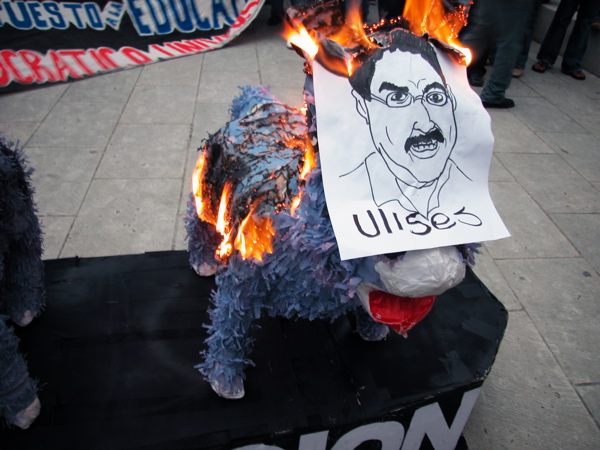
danielsan, ariel and emilyn thanks so much for publishing from Oaxaca. I really appreciate these updates which bring us the stories from the streets, and bring me to tears while also providing so much hope and inspiration.
Last summer while I was in Oaxaca City I began learning about the struggle for education, specifically at the UABJO (Universidad Autónoma Benito Juárez de Oaxaca). In the post above, danilesan wrote:
"I asked a teenage girl at the barricade about this--at the bottom of the banner it says ´Education for the children of workers before Education for the children of the bourguoise.´ She explained that advancement to higher education is limited in terms of funding--there are only so many spots, but the problem is that so many of those spots are ´reserved´ for the sons of the elite, for those who ´come with recommendations´or who can buy their way into higher education. Most have to discontinue their education when they are denied entrance to one, two, or three programs or schools."
Here is an article by Adriana and photos from August 19, 2005
No More Denied Students, No to Plan Juarez in Oaxaca
http://www.indymedia.org/or/2005/08/119088.shtml
(english with links to spanish (original) and greek and french translations)
photos by Bradley ;-)
http://santacruz.indymedia.org/newswire/display/18425/index.php
http://santacruz.indymedia.org/newswire/display/18427/index.php
"I was in the Carmen Plaza and I heard whistling and the chants were getting louder, “…education first for the children of the workers, educucation later for the children of the rich….” I quickly walked to encounter the march of students of the UABJO (Benito Juárez Autonomous University of Oaxaca), youth no older than 25 years that were walking in two lines, in the middle of the march was the students that were carrying large signs accusing the director of the university, Neri, of using Plan Juarez to decrease the quality of the education. Some of the main points of this plan are: privatize the education, increase the tuition, decrease the number of students, eliminate the students´ rights to elect their director, and other such cutbacks in overall quality of the education.
Approximately 20 police armed with batons, gas, and dogs prevented us from entering the main plaza, we looked for another entrance and we received the same line of police. In front of people from all over Mexico and tourists from around the world, a casket was light on fire that said “education” and two cardboard donkeys with the faces of the Governor, Ulises Ruiz and the director of UABJO, Neri. Here they explained that the governor of Oaxaca spent 700 million pesos (approx. 70 million dollars) on the “remodelization” of the historic center, meanwhile only 5 million pesos (approx. 500 thousand dollars) was spent for education; this was the pretext for denying more students at the university."
Last summer while I was in Oaxaca City I began learning about the struggle for education, specifically at the UABJO (Universidad Autónoma Benito Juárez de Oaxaca). In the post above, danilesan wrote:
"I asked a teenage girl at the barricade about this--at the bottom of the banner it says ´Education for the children of workers before Education for the children of the bourguoise.´ She explained that advancement to higher education is limited in terms of funding--there are only so many spots, but the problem is that so many of those spots are ´reserved´ for the sons of the elite, for those who ´come with recommendations´or who can buy their way into higher education. Most have to discontinue their education when they are denied entrance to one, two, or three programs or schools."
Here is an article by Adriana and photos from August 19, 2005
No More Denied Students, No to Plan Juarez in Oaxaca
http://www.indymedia.org/or/2005/08/119088.shtml
(english with links to spanish (original) and greek and french translations)
photos by Bradley ;-)
http://santacruz.indymedia.org/newswire/display/18425/index.php
http://santacruz.indymedia.org/newswire/display/18427/index.php
"I was in the Carmen Plaza and I heard whistling and the chants were getting louder, “…education first for the children of the workers, educucation later for the children of the rich….” I quickly walked to encounter the march of students of the UABJO (Benito Juárez Autonomous University of Oaxaca), youth no older than 25 years that were walking in two lines, in the middle of the march was the students that were carrying large signs accusing the director of the university, Neri, of using Plan Juarez to decrease the quality of the education. Some of the main points of this plan are: privatize the education, increase the tuition, decrease the number of students, eliminate the students´ rights to elect their director, and other such cutbacks in overall quality of the education.
Approximately 20 police armed with batons, gas, and dogs prevented us from entering the main plaza, we looked for another entrance and we received the same line of police. In front of people from all over Mexico and tourists from around the world, a casket was light on fire that said “education” and two cardboard donkeys with the faces of the Governor, Ulises Ruiz and the director of UABJO, Neri. Here they explained that the governor of Oaxaca spent 700 million pesos (approx. 70 million dollars) on the “remodelization” of the historic center, meanwhile only 5 million pesos (approx. 500 thousand dollars) was spent for education; this was the pretext for denying more students at the university."
!gracias danielsan! your reports are very important for us to stay informed!
We are 100% volunteer and depend on your participation to sustain our efforts!
Get Involved
If you'd like to help with maintaining or developing the website, contact us.
Publish
Publish your stories and upcoming events on Indybay.
Topics
More
Search Indybay's Archives
Advanced Search
►
▼
IMC Network


